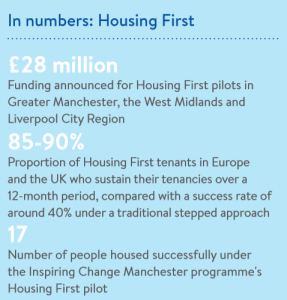Sarah Walters, Development Manager at Shelter, discusses Housing First’s approach to solving chronic homelessness.
Housing First is everywhere. An announcement from Sajid Javid, secretary of state for housing, communities and local government, of £28 million for pilots in Greater Manchester, the West Midlands and Liverpool City Region, has chimed with many stories in the press of complex individuals being housed successfully, including women and those with multiple challenges around addiction, mental health and offending.
Inspiring Change Manchester (ICM), a programme led by Shelter, funded by the Big Lottery Fulfilling Lives Programme, has now published interim evaluations from its Housing First pilot. We work with and for those who have experienced multiple disadvantages. The pilot has been running since April 2016 and seeks to test whether Housing First, run close to proven principles, works in Manchester for a group of people with poor housing histories and often chaotic lives.
Unconditional Approach
 Housing First is a practical approach to solving chronic homelessness underpinned by philosophical principles including housing as a human right, and tenants being given choice and control. The provision of a tenancy is fundamentally unconditional and there is no requirement to engage with support conditions in order to retain it.
Housing First is a practical approach to solving chronic homelessness underpinned by philosophical principles including housing as a human right, and tenants being given choice and control. The provision of a tenancy is fundamentally unconditional and there is no requirement to engage with support conditions in order to retain it.
A Housing First tenant is treated the same as any other tenant; no additional clauses around behaviours or engagement, no sanctions for not meeting support appointments. The approach has been used nationally and internationally. It began in New York in the 1990s and has now been adopted across the US and wider world. In Europe and the UK, 85-90% of tenants sustain their tenancies over a 12-month period. The traditional ‘stepped’ method requiring abstinence, sobriety and tenancy readiness has a success rate of around 40%.The numbers remain impressively consistent across countries. And yet these are often tenants with very poor or non-existent housing histories. They are almost certainly not ‘tenancy-ready’ in any recognised sense.
Housing First takes away this requirement and recognises that in order to begin to address some of the issues which have caused complex dependency, it is vital that someone has a place they can call home.
At ICM, our small cohort of 17 housed so far shows a current tenancy sustainment rate of 100% in private and social housing. Where someone had moved on because of personal choice or circumstance, it has been planned and considered, rather than an emergency eviction. The benefits to the individuals are great.
ICM provides opportunities to mix with others, addressing social isolation as well as giving volunteering opportunities. The psychological impact of having a home, sometimes for the first time, is huge for tenants, bringing benefits around stability and wellbeing. The support offered is vital. Person-centred, flexible in terms of delivery, not time-limited, holistic and taken at the pace of the tenant, it is a lot more than floating support. Support workers and peer mentors are infinitely patient, committed, trauma-informed and in for the duration. Often they have lived experience of homelessness. It makes a huge difference.
Cost-effective approach
And it works for the public purse too. The evaluation shows cost benefits to the public purse in adopting a Housing First approach with savings already identified for health, criminal justice and housing. We expect that the final evaluations will confirm our expectation that Housing First saves money across the system as well as changing the lives of those who benefit from it. We know the approach works. Lives, at best, are saved through the provision of housing: they are all improved and stabilised. The challenge now is to take it to scale, keeping it true to the principles that underpin it, remaining focused on those who need it most
To discuss the issues raised in this article, contact liz.zacharias@campbelltickell.com
This article also appeared in the CT Brief, Issue 33: Care & Support edition



